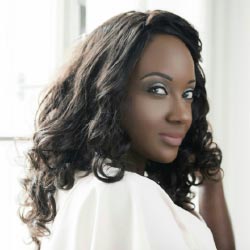
Selections from Handel’s Messiah
April 6-7, 2024
Melody Wilson
Biography
Melody Wilson has gained recognition as an accomplished operatic artist in the United States and Europe, equally celebrated in classic and contemporary repertory. Praised for her “rich voice and great acting chops” (St Louis Post-Dispatch), her “smoky mezzo-soprano and stately deportment” (Opera News), and her “beautiful voice and well-honed technique” (San Francisco Classical Voice), she’s been hailed for performances that “reign supreme” (St Louis Magazine) and for her “fine comic work” (Broadway World).
In 2023-24, she appears in Wagner all over the United States, making her Lyric Opera of Chicago debut as Mary in Der Fliegende Holländer, and returning to Seattle Opera as Fricka in Das Rheingold and to the Dallas Symphony as Roßweiße in Die Walküre.
Wilson has enjoyed a varied 2022-23, covering Olga in Tchaikovsky’s Eugene Onegin and John Adams’ new Antony and Cleopatra at San Francisco Opera, and Cousin Blanche in Terence Blanchard’s Champion at the Metropolitan Opera. Her season commenced with performances of Olga, and of Meg Page in Verdi’s Falstaff at Union Avenue Opera, and a concert performance of the mezzo-soprano role in Paul Moravec’s Sanctuary Road with Chautauqua Symphony Orchestra, which she reprised in the staged opera version of the work with the Penn Music Festival in February and will revive with the Bach Festival Society of Winter Park in 2024. She returned to a favorite role, Fenena in Verdi’s Nabucco, with Washington Concert Opera in March. Her season concludes in May with a Beethoven’s Symphony No. 9 with the Brooklyn Chamber Orchestra, and a new work by Martin Rokeach, Bodies on the Line: The Flint Sit-down Strike, with the Oakland Symphony.
In 2021-22, Wilson debuted with the San Francisco Symphony, performing a concert including Brahms’ Alto Rhapsody and spirituals arranged by Jack Perla. She also debuted with the Oakland Symphony, singing songs by Richard Strauss and H. Leslie Adams, and prepared the mezzo-soprano soloist in Tippett’s A Child of Our Time, under the baton of Leonard Slatkin (canceled due to pandemic). Other company debuts included Baltimore Concert Opera in the role of Principessa di Bouillon in Cilea’s Adriana Lecouvreur, the role of Mum in Britten’s Albert Herring with the Princeton Festival, and Olga in semi-staged performances of Eugene Onegin with the Dallas Symphony and maestro Fabio Luisi.
In the 2020-21 season, Wilson performed in a world premiere at Opera Theatre of Saint Louis, New Works, Bold Voices Lab, a triptych of brief operas. She performed both the roles of Kyra and Son in On the Edge (Laura Karpman) and Janet Armstrong in Moon Tea (Steven Mackey). Her OTSL season also included I Dream a World, the company’s
first celebration of Juneteenth, at the Missouri History Museum. She made company debuts with Indianapolis Opera as Suzuki in Madama Butterfly and with Cincinnati Opera as Mercédès in Carmen, and with the Kalamazoo Symphony in Beethoven’s 9th Symphony. In the 2019-20 season, Wilson made her debut with Seattle Opera as Olga in Eugene Onegin, adding a solo recital there and a joint recital with bass Zachary James in Sun Valley, Idaho.
Prior to the pandemic, Ms. Wilson long cultivated a reputation in both classic and contemporary repertory. Roles in the former not mentioned above include a particularly celebrated run of Addie in Blitzstein’s Regina (Opera Theatre of St. Louis), Linda in Lost In The Stars (Union Avenue Opera), Mrs Sedley in Peter Grimes (Theater Bremen), Maddalena in Rigoletto (Hungarian State Opera), Zweite Dame in Die Zauberflöte, Strawberry Woman in Porgy and Bess, Kate in The Pirates of Penzance, and Flora in La Traviata (Opera Delaware).
In contemporary repertory, she has performed the mezzo in the Opera Box Quartet in John Corigliano’s The Ghosts of Versailles (Wexford Opera Festival, Opera Theatre of St. Louis). As a Gerdine Young Artist, she covered Denyce Graves in the original mezzo-soprano version of the role of Emelda in the world premiere of Terence Blanchard’s opera Champion (Opera Theatre of St. Louis). She sang Blumenmädchen in the world premiere of Mondparsifal Alpha 1-8, Jonathan Meese’s adaptation of Wagner’s Parsifal (Wiener Festwochen and the Berliner Festspiele). She garnered particular acclaim as Mrs. Miller in Union Avenue Opera’s production of Douglas Cuomo’s Doubt, for which she was nominated for the St. Louis Theater Circle Awards in the category “outstanding achievement in opera.”
Wilson is also known internationally as a concert soloist and recitalist. Among other concerts she has performed Berlioz’s Les Nuits d’Eté (Slovak State Philharmonic), Beethoven’s 9th Symphony (various orchestras), Haydn’s Theresienmesse (Wexford Opera Festival Orchestra and Vienna’s Consortium Musicum), as well as Haydn’s Missa in Tempore Belli and Schubert’s Mass No. 3 in b-flat major (also with the Consortium Musicum). She was a featured soloist in Las voces de Montserrat Caballé in Zaragoza, Spain, and in The Sacred Music of Duke Ellington (Wilmington Jazz Festival) and has presented solo recitals at the US Embassy in Bratislava, the Weidner Center for the Performing Arts in Green Bay, Wisconsin, and the Barocksaal Vienna.
Wilson holds undergraduate degrees in Music and Spanish from the University of Delaware and a Master of Music and an Artist Diploma from the University of Michigan-Ann Arbor, where she studied with Shirley Verrett and George Shirley. She hails from Newark, Delaware and is based in Vienna, Austria
_____________________________________________
A busy prelude to ‘Messiah’
You’re in rehearsals for Atlanta Opera’s production of Benjamin Britten’s “A Midsummer Night’s Dream,” an opera which combines challenging music with energetic staging on a complicated set.
At the same time, you’re preparing for your Carnegie Hall debut singing Mozart’s Requiem Mass in New York, as well as Paul Moravec’s oratorio Sanctuary Road in Florida and Verdi’s Aida in St. Louis. That’s after you’ve sung three different Wagner operas with three different companies (Lyric Opera of Chicago, Seattle Opera and Dallas Symphony).
And on top of all that, you’re getting ready for your featured performance in Handel’s “Messiah” with New West Symphony April 6 and 7 — your first-ever time singing this classic work.
“It is an interesting mix to work on Moravec, Britten, Mozart, Händel, Wagner and Verdi at the same time,” says Melody Wilson, reflecting on her busy fall and winter. “But that is what we singers have to do.”
Such a mix of projects is natural for this young, very-in-demand mezzo soprano who has garnered international acclaim in a remarkably short time. Within the past two years alone, Melody has appeared in classic and contemporary operas, from Tchaikovsky’s Eugene Onegin and Verdi’s Falstaff to John Adams’ Antony and Cleopatra and Terence Blanchard’s Champion.
Her performances in these productions as well as solo recitals in the U.S. and abroad have earned rave reviews from critics for her rich, warm voice, strong acting technique and ability to handle a diversity of roles. That’s no surprise, considering her interest in a variety of musical genres from the time she was growing up in Maryland.
“Music was always important on my father’s side of the family,” Melody recalls. “All types — jazz, church music, pop. My grandfather was a high school band teacher, and as a child I remember singing along to Whitney Houston in my grandmother’s basement, with my dad playing piano. It was just fun.”
She played clarinet and bass clarinet, “but I thought, singing is fun too, so I sang in the choir.” Between that and playing in her high school marching band, being a “band geek” and serving as drum major, “music was always there.”
Yet Melody began her undergraduate studies at the University of Delaware with a double major in Psychology and Spanish. Music was a minor until “some convincing” from the Music Department encouraged her to drop Psychology and major in Music, though she kept the Spanish major.
“As an undergrad, I started taking graduate classes in Political Science, because I had dreams about serving as an interpreter for the United Nations,” she says. “And the grad classes I took in Urban Policy and Public Planning resulted in an offer of a full ride for graduate school if I wanted to do that. I decided I would apply to the top music schools, and if I didn’t get in, I’d take that offer for Urban Policy and do that program.”
But she was accepted by the University of Michigan for graduate and postgrad studies in Music. Studying with noted teachers Shirley Verrett and George Shirley, she earned a Master of Music and an Artist Diploma.
She also received life lessons that have kept her grounded and focused amid the challenges of a career in music.
“Shirley Verrett said, as have many people, ‘Hurry slowly,’” says Melody. “It’s so appropriate, because people in the industry will want to push you one way or another, and you must stay the course and do things in an appropriate way for your journey. Not everyone’s journey is the same.”
Melody also learned the importance of having “a team” to rely on in tough times, and being part of a team to help others.
“My support system keeps me going,” she says. “Not just family — the core family members who have always been supportive of my career — but also my colleagues who are really close friends and understand exactly what happens in our business, which is sometimes very tricky and very challenging to navigate without consulting mentors and other colleagues.
“Luckily, I have those people, both professionally and emotionally. Everyone who is successful in the field has those folks they can ask questions of, trust and lean on, people who will be really open and honest with them.”
Amid all she has going on, Melody looks forward to her first time singing the alto portion of Handel’s “Messiah” with New West Symphony, especially “He was despised” near the beginning of Part II. “I adore that piece,” she says, noting that she’s been listening to the version by acclaimed opera star Florence Quivar, “who sang it so beautifully.”
The entire “Mesiah” experience, she adds, promises to be among her most memorable.
“One never forgets their first time,” Melody says, “so it’ll be special to me forever. The drama of ‘Messiah,’ the text and the story are all so powerful. People are drawn to its music and its message, and that’s why it’s such a moving piece.”
